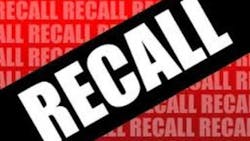GM Recalls Another 1.8 Million Vehicles Amid Safety Probe
CHICAGO -- General Motors (IW 500/5) announced its second massive recall in two months on Monday as it works to contain a growing scandal over the safety of its vehicles.
The latest recall of nearly 1.8 million vehicles linked to three new problems comes as a result of an internal probe into why it took the largest U.S. automaker so long to acknowledge a deadly ignition defect.
GM is facing multiple investigations by U.S. authorities over its slowness to react to evidence linking a defective ignition switch to 31 accidents and 12 deaths in its 2005-7 Chevrolet Cobalt and 2003-7 Saturn Ion models.
The problem was detected at the pre-production stage as early as 2001, but GM waited until last month to recall 1.6 million vehicles in North America.
Monday's recall covered three different defects unrelated to the ignition problems, none tied to reports of accidents or injuries, GM said.
The bulk of the vehicles recalled Monday -- more than 1.5 million -- were sold in the United States. Some 97,000 were sold in Canada and the remainder were sold in other markets around the world.
Of the vehicles recalled Monday, some 1.3 million were due to a defective service air bag warning light.
The defect could prevent air bags and seat belts from deploying during a crash.
That recall affects Buick Enclave and GMC Acadia models from the 2008-2013 model years, Chevrolet Traverse from the 2009-2013 model years, and Saturn Outlook from the 2008-2010 model years.
A failure to comply with a head impact requirement for unrestrained occupants led to the recall of 355,000 Chevrolet Express and GMC Savana from the 2009-2014 model years.
A problem with a brake booster pump which has been linked to two engine fires in unsold vehicles at dealerships led to the recall of 66,000 Cadillac XTS full-size sedan from the 2013 and 2014 model years.
However, the automaker said it will take a $300 million charge in the first quarter to cover the cost of the recalls and repairs.
The ignition recall is the first big crisis for new chief executive Mary Barra, who took the company's helm on January 15 as the first woman to lead a major automaker. Barra responded forcefully, announcing she would release an "unvarnished" report following a thorough review and vowing to improve how GM handles defect reports.
"Today's announcement underscores the focus we're putting on the safety and peace of mind of our customers," Barra said on Monday. "I asked our team to redouble our efforts on our pending product reviews, bring them forward and resolve them quickly."
In a video statement to employees, Barra called the federal probes "serious developments that shouldn't surprise anyone."
"After all, something went wrong with our process in this instance and terrible things happened," she said.
Barra's transparency recognizes the damage the company could face after painstakingly rebuilding its reputation following a 2009 government-backed bankruptcy. Rival Toyota's once-stellar reputation was tarnished when it recalled some 12 million vehicles worldwide at a cost of $2.4 billion in 2009-2010. Toyota executives were forced to appear at U.S. Congressional hearings, where they were sharply denounced for allegedly hiding and downplaying dangerous defects in some of the company's most popular models.
GM faces only small official fines at the moment: a possible $35 million, minute compared to $155 billion in revenues last year.
Ratings group Standard and Poor's said that it would monitor the impact of the recalls on GM's "competitive position."
"We believe reputational effects on GM could reduce the company's market share or pricing power, even though the company no longer produces the vehicles in question," the ratings agency wrote, adding that the financial impact "should be manageable."
-Mira Oberman, AFP
Copyright Agence France-Presse, 2014
About the Author
Agence France-Presse
Copyright Agence France-Presse, 2002-2025. AFP text, photos, graphics and logos shall not be reproduced, published, broadcast, rewritten for broadcast or publication or redistributed directly or indirectly in any medium. AFP shall not be held liable for any delays, inaccuracies, errors or omissions in any AFP content, or for any actions taken in consequence.
